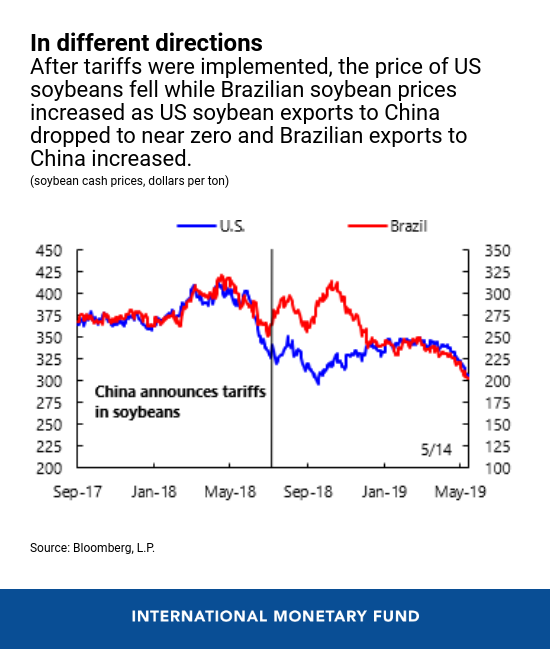Trade War Triggers Fear of Declining Oil Demand
Evidences are surfacing suggesting that the trade feud between America and China is beginning to bear down on oil demand, particularly in the transportation and aviation industries, and it is feared that the U.S. freight system could be the next victim, leading to a decrease in diesel consumption. There is a noticeable reduction in container services from the Oriental power to the Western giant, and American aviation corporations warn of possible contraction in consumer expenditures due the downtrend in consumer attitude because of the tariff measures and a likely spike in prices. Seeing that both shipping and aviation represent approximately 10% of the world’s oil usage, any drop in container transport is sure to adversely impact demand, and the situation could further worsen if the U.S freight industry takes a blow, an outcome that market watchers are anticipating.
Executives from Hapag-Lloyd, a major player in the global container shipping industry, informed Reuters in the previous week that trade war tensions and tariff escalations have led clients to cancel approximately one third of cargo transport from China to the U.S. However, they observed a significant increase in demand for services from Southeast Asian countries such as Thailand, Vietnam, and Cambodia, as reported by a Hapag-Lloyd representative.
Mitsui O.S.K. Lines Ltd, the renowned Japanese Maritime corporation, anticipates a dip in the year’s profit margins due to suspected slow movement of cargo amid ‘worries about inflation and potential stagnation in the global economy due to the U.S. tariff moves.’ The leisure industry is also feeling the effects of the declining consumer mood— Norwegian Cruise Line Holdings reports a weakening in its 12-month forward booked position.
Acknowledging potential threats to revenue, President and CEO Harry Sommer expressed confidence in mitigating them through an unwavering commitment to cost-saving strategies. In addition, Clarksons, a reputable shipbroker located in London, issued a cautionary note on profit, attributing it to the ‘uncertainty caused by the potential for a global trade conflict that seems to be intensifying.’
Gene Seroka, the Executive Director of the Port of Los Angeles, voiced his concerns on CNBC this week, predicting a drastic reduction, about 35%, in the volume of cargo incoming from China in the following week compared to the same timeframe in 2024, attributing this to the fact that American retailers are ceasing shipments from China as a result of these tariffs.
According to a review by Apollo Global Management presented to clients in late April, the reduced transport lanes from China to the U.S are likely to impact the American trucking industry negatively. It further warns that by mid-May, container shipping to American ports will come to a standstill, and by the end of May, there might be an abrupt decrease in the demand for trucking. The onset of June might witness layoffs in the trucking and retail sectors, possibly ushering in a recession in the summer of 2025.
Furthermore, the firm predicts eroding consumer confidence and business faith in the U.S. There’s a steadily increasing proportion of consumers who believe business conditions are getting worse, Apollo’s gloomy forecasts suggest. These projections also indicate an imminent issue of bare shelves and shortages akin to those observed during the Covid pandemic.
The airline industry is reporting a downturn in leisure demand as consumers curb spending in anticipation of rising inflation and a deteriorated economy. Southwest Airlines’ President and CEO Bob Jordan commented on the trend in a recent earnings call, saying that despite a strong start to the year, demand has since slackened significantly as the quarter has moved forward.
The present U.S. administration’s policy decisions seem to be marked by sudden changes, including in matters relating to tariffs and trade conflict, leading to a certain erosion of business and consumer sentiment in the short term. Major investment banks are now using a possible recession as the base case in their forecasts.
Oil demand forecasters like the International Energy Agency (IEA), the Organization of the Petroleum Exporting Countries (OPEC), and the U.S. Energy Information Administration (EIA) have all lowered their outlooks for demand growth. Responding to the changing winds, the IEA has trimmed its estimate for global oil demand growth in 2025 by as much as 300,000 barrels per day.
Similarly, OPEC has drawn down its forecast for demand growth by 150,000 barrels per day, while the EIA has made a significantly larger cut, reducing its growth projection by 400,000 barrels per day. The fallout from the ongoing trade war is broadly expected to ripple through economic sectors, levying both direct and indirect impacts on the global economy.

